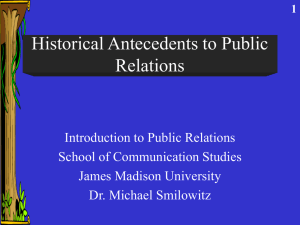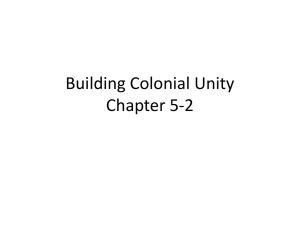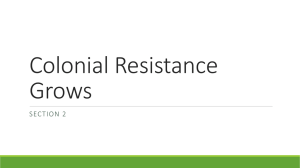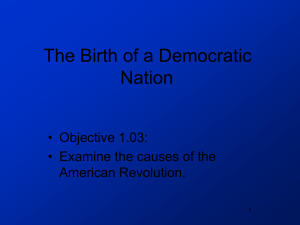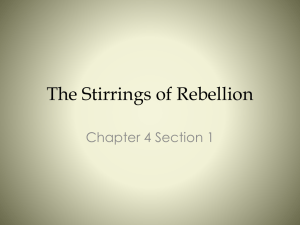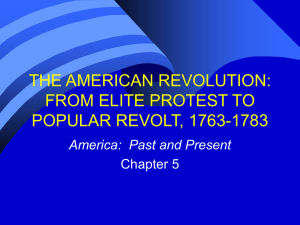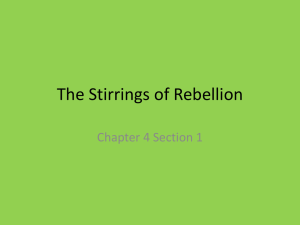Ch.6, Sec.2 * Colonial Resistance Grows
advertisement
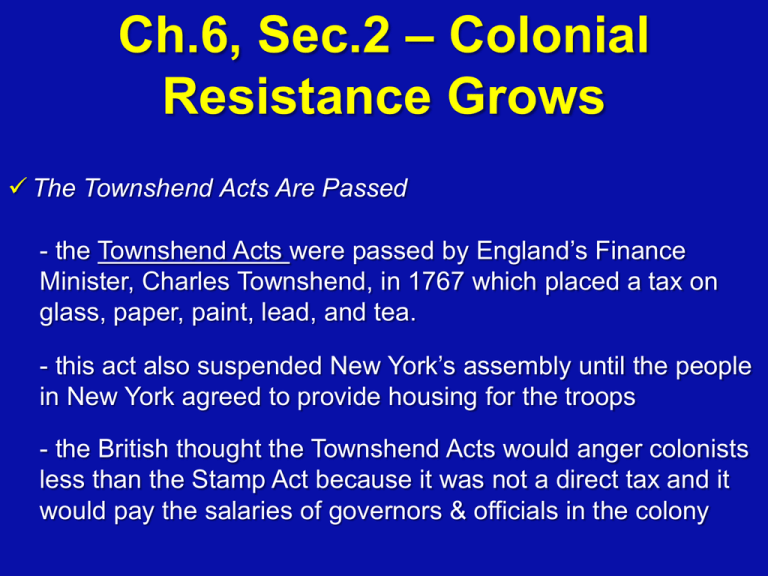
Ch.6, Sec.2 – Colonial Resistance Grows The Townshend Acts Are Passed - the Townshend Acts were passed by England’s Finance Minister, Charles Townshend, in 1767 which placed a tax on glass, paper, paint, lead, and tea. - this act also suspended New York’s assembly until the people in New York agreed to provide housing for the troops - the British thought the Townshend Acts would anger colonists less than the Stamp Act because it was not a direct tax and it would pay the salaries of governors & officials in the colony Ch.6, Sec.2 – Colonial Resistance Grows - British officials attempted to enforce the Townshend Acts by issuing writs of assistance, which were blank search warrants to enter homes and businesses to search for smuggled goods. Charles Townshend Ch.6, Sec.2 – Colonial Resistance Grows The Reasons for Protest - John Dickinson claimed the issue was if “Parliament could legally tax colonists without permission?” - the writs of assistance angered the colonists because they violated their natural rights described by John Locke Ch.6, Sec.2 – Colonial Resistance Grows Tools of Protest - the leader of the Boston Sons of Liberty was Samuel Adams, who called for a boycott of all English goods in response to the Townshend Acts - the Daughters of Liberty asked colonists to weave with their own cloth and use American products - riots broke out in Boston and custom officials were forced to flee! Samuel Adams Ch.6, Sec.2 – Colonial Resistance Grows The Boston Massacre - on March 5, 1770, workers began protesting the Redcoats’ presence in Boston and began rioting in front of the Custom House - an African-American, Crispus Attucks, and four others were killed by the Redcoats Crispus Attucks - the Sons of Liberty called the event the Boston Massacre Ch.6, Sec.2 – Colonial Resistance Grows - people in the colonies were outraged and believed the four men had given their lives for freedom - this drawing by Paul Revere became a tool for anti-British propaganda Ch.6, Sec.2 – Colonial Resistance Grows Ch.6, Sec.2 – Colonial Resistance Grows Ch.6, Sec.2 – Colonial Resistance Grows - the Redcoats were arrested for murder, but John Adams (cousin of Samuel Adams) offered to defend them in court - Adams wanted to show the world and England the colonists could follow the rule of law - Adams argued for self-defense and the soldiers won, but the symbol of British tyranny remained John Adams Ch.6, Sec.2 – Colonial Resistance Grows The Tea Act - on the day of the Boston Massacre, Parliament repealed the Townshend Acts, except the tax on tea - the colonial boycott had been effective and British trading was suffering as a result - Samuel Adams began the committees of correspondence to keep people aware of the cause for liberty Ch.6, Sec.2 – Colonial Resistance Grows - in 1773, Parliament passed the Tea Act, which required the colonists to pay a tax on their tea (they were used to smuggling tea from Holland for no tax!) - tea was exceedingly popular in the colonies, so this further enraged the colonists Ch.6, Sec.2 – Colonial Resistance Grows The Boston Tea Party - on December 16, 1773, the Sons of Liberty organized what came to be known as the Boston Tea Party as a way to protest the Tea Act - 342 chests of tea were thrown into Boston Harbor and England would not relent on their stance with the Tea Act, further fanning the flames of rebellion against the British!!! Ch.6, Sec.2 – Colonial Resistance Grows Ch.6, Sec.2 – Colonial Resistance Grows


